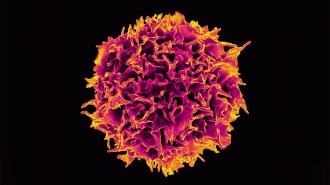All Stories
-

A long-awaited cancer treatment reaches patients
Print and Longform Managing Editor Erin Wayman discusses the recently approved T cell therapy for cancer patients.
By Erin Wayman -

-
 Microbes
MicrobesMore than 100 bacteria species can flourish in microwave ovens
Swabs of 30 microwave ovens in different settings identified over 100 bacterial species, some of which could be pathogenic or cause food-borne disease.
-
 Health & Medicine
Health & Medicine50 years ago, antibiotic resistant bacteria became a problem outside hospitals
Infections from drug-resistant bacteria have skyrocketed over the last 50 years. Now, new technologies could help doctors save lives.
-
 Oceans
OceansNational Geographic’s ‘OceanXplorers’ dives into the ocean’s mysteries
National Geographic’s documentary series ‘OceanXplorers,’ produced by James Cameron, invites you aboard one of the most advanced research vessels in the world.
By Abby Wallace -
 Health & Medicine
Health & MedicineNew COVID-19 booster shots have been approved. When should you get one?
The vaccines target the omicron variants currently circulating in the United States.
By Tina Hesman Saey and Meghan Rosen -
 Health & Medicine
Health & MedicineA newly approved ‘living drug’ could save more cancer patients’ lives
Tumor-infiltrating lymphocyte, or TIL, therapy is the first T cell treatment for solid tumors. It fights melanoma and maybe other cancers too.
By Meghan Rosen -
 Agriculture
AgricultureCan scientists make fruits and veggies resilient to climate change?
Combining traditional plant breeding with new genomics tools is allowing scientists to grow plants that are better adapted to a warming climate.
By Amanda Heidt -
 Climate
ClimateZapping sand to create rock could help curb coastal erosion
Low voltages generated minerals that help bind the sand into erosion-resistant rock, offering hope for shorelines ravaged by waves.
By Sid Perkins -
 Health & Medicine
Health & MedicineExpanding antibiotic treatment in sub-Saharan Africa could save kids’ lives
Current guidelines limit treatment to infants. Giving antibiotics to at-risk kids under 5, too, has an indirect effect on infant survival, a new trial shows.
By Anna Gibbs -
 Physics
PhysicsThe world’s fastest microscope makes its debut
Using a laser and an electron beam, the microscope can snap images of moving electrons every 625 quintillionths of a second.
By Skyler Ware -
 Earth
Earth‘Turning to Stone’ paints rocks as storytellers and mentors
Part memoir, part geology explainer, Marcia Bjornerud’s latest book explores the hidden wisdom of Earth’s rocks.